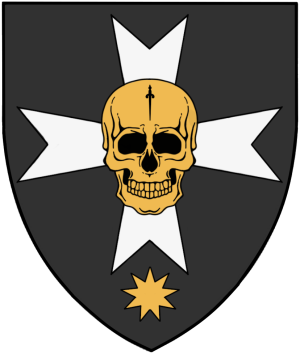The Imperial Hexenjägers
|
| Head of the Cult | Kurt Von Drachenfels |
| Seat of Power | Adelsburg |
| Territory | The Empire |
| Primary Religion | Alderism |
| Holy Sites | The Grand Cathedral of Alder |
| Active in | The Hadrian Empire |
Introduction
With their roots tracing back to the days of the old Kingdom, Witch Hunters, also known as Hexenjägers in Attian, are experts in rooting out the Chaotically corrupt between the masses and nobility. Wielding specialized weapons and equipment, these men and women of the Empire have been brought back into service since 1550 by orders of the Imperial Diet to aid the Temple of Alder in their fight against the Demon, the Heretic, and the Mutant. For in their eyes, innocence proves nothing.
To meet a Witch Hunter is to face a judge, a jury, and, at times, an executioner. They instill fear in even the innocent; their presence is often seen as a bad omen, for they only appear when their tasks demand it. Having the authority to act as hands of the Temple of Alder, their justice is often swift but brutal in its practice, for there can be no leniency in the fight against the Corruption of Dolus The Deceiver.
| "I ain't met a witch yet that won't catch fire!"
- Witch Hunter Lutz Hammerstern while loading his stake launcher before charging into a cult’s lair. |
Hammers of Faith
Witch Hunters do come in many shapes and sizes, ranging from the cold and dispassionate, regarding all that they do as simply a job, to those whose zeal for hunting down the Witch, Heretic, and Demon knows no end and who would burn an entire village rather than let a single Heretic go away. As Witch Hunters get older and grizzled and the number of horrors they witness increases, many become extreme in their views, more like the archetypical Inquisitors of the Temple of Alder, who believe that everyone could be guilty. The only thing different was the decree. A few scholars have wondered if Witch Hunters who have this attitude might not fall into the corruption of Demons unwittingly due to their long-term exposure. But they do not wonder about it too loudly.
There are hundreds of stories about their deeds, some little more than legend, others terrifyingly recent. The popular image of the grim-faced protectors in service of the Temple of Alder is one that the various Witch Hunter groups actively foster. Hence, the common belief is in a cohesive shadowy agency of Witch Hunters roaming the far reaches of the realm and beyond. The truth, of course, is a bit more complicated. Witch Hunters are not the infallible men of iron of popular myth. While many possess official mandates to pursue the unnatural, many are little more than vigilantes, zealous fanatics, ex-military, or nobles who sought for a more thrilling, adventurous lifestyle.
Many of these Witch Hunters came from so-called hired hands. The easiest of all the Witch Hunters to understand in both practice and origin. They are seldom more than highly specialized mercenaries equipped with weapons and religious armaments of the Temple of Alder. The most famous of these groups was known as the Nachtbrüderschaft, who were transferred into a full authoritarian Witch Hunter organization by Vater Gottfried The Redeemed in 1550 A.F.S.
For the proper amount of gold or request to the Clergy of the faith, they will patrol the lands of various nobles, remove any suspicious, dangerous, or troublesome elements, and report back to the highest authority of the Alderist Temple. Depending on the nature of the Witch Hunter or the task at hand, the men might be highly professional investigators or bloody-handed killers on commission. Sometimes, they will disdain their usual wear to investigate incognito. But usually, they would trade under fear and the panic provoked by the signature clothing of their trade.
It is not uncommon for these mercenary hunters to be followed by stories and acts of corruption. Stories of bribery are a dime in a dozen. Witch Hunters who are found to participate in these acts are often excommunicated or outright executed for treason or even heresy by the Temple of Alder, no matter their origin or background. Devout Witch Hunters are those rare few who are motivated by the call of Alder and the faith or simply for the concern of the people. These religious men fight Chaotic corruption through faith, fear, and fire. Some even embrace religion in their duties as a whole due to the horrors they may face while in service of the Temple.
Appearance & Lifestyle
Generally speaking, Witch Hunters are men and women accustomed to fighting. They are well-armed and fit physically. They favor hooded cloaks and headgear to conceal their appearance from the overly curious, as not everyone appreciates their holy work and viciously hate Alder’s hunters for many lost loved ones to their silver bolts. Some wear many religious ornaments, while others even pick up pieces of armor to protect themselves against the horrors of the Chaotic Realms. It is not unusual to see them wear trinkets of silver, for it is believed silver offers protection against witchcraft and may even be used as a weapon against those Chaotically corrupt or mutated. Their weapons range from unique personalized swords, rapiers, and cutlasses to crossbows, stake launchers, and potions to counter all sorts of abominations and heretics.
Each Witch Hunter has their own unique approach to their trade. Some have their backgrounds from the Nobility, thus conducting their work with precision and a desire for recognition and fame. Others, often hailing from rougher origins, may resort to more forceful methods, showing little concern for collateral damage. Despite these differences, Witch Hunters regularly convene to share their experiences and exchange information about ongoing missions. These gatherings occur in various locations, including near holy sites, taverns, backstreet alleys, and even within the bases established by some Witch Hunters themselves. Seasoned members of this secretive fraternity often regale their peers with tales of their encounters with supernatural and Chaotic entities, frequently accompanied by a drink or two. Nevertheless, it is widely understood that prying for explicit details about their endeavors is ill-advised, as it can draw unwanted attention from the organization.
Function & Organisation
While they are often considered vigilantes or rogues, Witch Hunters enjoy the firmest footing in the law, which balances between both religion and state. As they are legal agents of their sponsor and often carry its banner, they are frequently given extra power from the nobility that tends to hire or request them. One may always see a Witch Hunter carry religious trinkets or purist seals stamped on their attire to showcase their achievements, display their loyalty to their faith, or ward off Chaotic magic.
Barring some exceptional circumstances, they all carry a charter document detailing when, where, and how they might perform their duty. This license, or Mandate, as it is known, grants the Hunter the right to search, detain, imprison, trial, or even execute anyone who they deem suspicious or if the need in the situation arises. Thus, all punishments are considered to be issued directly from the Clergy themselves. The only ones exempt from this are the nobility and royal family, for if thorough investigations need to be held, these have to be requested first by both the clergy and the state. One can be quick to notice that a Witch Hunter has a limited area of influence. As the Temple grants them their power, their jurisdiction usually ends at the boundaries of the state laws or specific province borders. Supporting the Witch Hunters are a variety of mercenaries, priests, licensed wizards, and zealots of various Alderist Cults. These provide everything from additional military support to holy protection. Often, Witch Hunters form small retinues in order to achieve the more challenging tasks of seeking out the Chaotically corrupt or even request assistance from Imperial Mages to counter figures that are more magically inclined in the dark arts of Chaotic Magic so that justice can be delivered upon them. To an Imperial Witch Hunter, nothing may stand in the way between them and their target, whom they deem an enemy of both humanity and their faith. Hence, leniency or mercy is often replaced by sheer extremist practices. More often, Witch Hunters who lean more towards the way of the clergy usually enter their ranks and become official Inquisitors. Hence, inquisitors tend to dispatch Witch Hunters to locate pockets of Heretical movement and, if need be, deliver Alders' righteousness upon them. While it is a common belief that Witch Hunters are quick to execute those deemed guilty, on the contrary, the primary mission of a Witch Hunter is to deliver their target alive, in shackles, before the Temple of Alder for them to be trialed by the law. Only when no other option is available, and the situation requires it, will a Witch Hunter act as executioner.
Though they serve with their authority and even fight under their banner at times, Witch Hunters can never be called upon to act as soldiers or bannermen for the Temple. Their role is merely to investigate, report, and or bring justice to the enemies of the faith, all within the boundaries that the laws of the Empire allow.
| "They wail and complain about my... uncompromising methods, but who among you can say that hanging half a village of peasants is a high price to pay for the assurance that corruption has been exposed and destroyed this day?"
- Jurgen Volkemar, Witch Hunter acting within the Hinterlands. |


